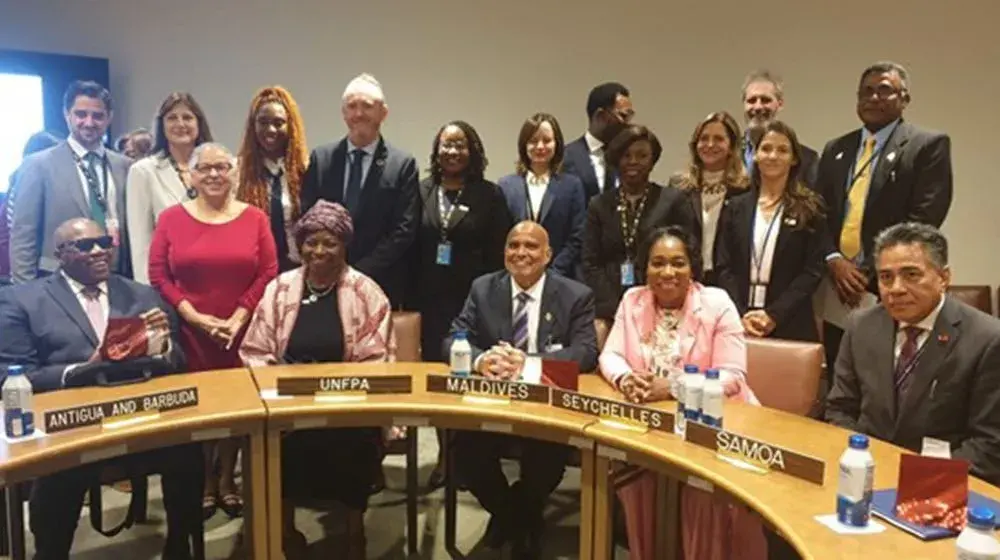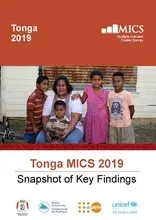UNFPA Pacific, March 27 (2014) Suva - COUNTRIES blessed with sizeable youth population bases, like most of our Pacific island nations whose young people comprise a third of their population, must invest in adolescents now to ensure they reap the benefits of having a demographic dividend, a recently-released UN report says.
The report, ICPD Global Review Report, reminds countries of the critical importance of developing an educated, healthy, secure and empowered youth population which is a prerequisite for development and inclusive economic growth.
When young people are accessible to sexual and reproductive health services and information and if they can realize their right to utilizing these services to delay family formation for example, the country benefits from a productive workforce which can jump-start economic growth and spur the innovation needed for a sustainable future.
A demographic dividend refers to a window of opportunity in human resources where declining fertility rates provide a period when the proportion of young and economically-productive cohort is large. The "dividend" can only be achieved if governments invest in the capacity-building of this group.
There are more young people than ever in the world with the proportion entering productive and reproductive years at a historical high - 25 per cent of the total population in 2010. In Asia Pacific, youth number 750 million or 60 per cent of the total world youth population. The Pacific's total population reached 10 million in 2010; youth (between 15-24) comprise one third.
"Safeguarding the rights of young people and investing their human capital deserve urgent attention, including access to quality education and training linked to expanding sectors of the economy, sexual and reproductive health information, education and services and their participation in the design and evaluation of programs for which they are the intended beneficiaries," Dr Laurent Zessler, the UNFPA Pacific director and representative said.
The report is 179 governments' frank assessment of their performance in the implementation of the Program of Action (PoA) of the International Conference on Population and Development (ICPD) in Cairo (Egypt) in 1994. It was produced at the request of the General Assembly by the ICPD+20 Secretariat, housed in the United Nations Population Fund (UNFPA) headquarters.
The Cairo conference is considered a landmark meeting in the context of human development because it was when world leaders then decided to place human rights and personal dignity at the heart of development, emphasized the empowerment of women and girls for the wellbeing of families, nations and the world, and affirmed sexual and reproductive health as a fundamental human right.
The report clearly shows the Cairo PoA has significantly contributed to tangible progress: fewer women are dying in pregnancy and childbirth; skilled birth attendants have increased by 15 per cent worldwide since 1990; more women have access to education, work and political participation; more children go to school and fewer adolescent girls are having babies. Population growth has also slowed partly as a result of the new approach - emphasis on individual decision-making in population trends.
However there is much to be done to achieve the principal goals of the PoA wholly as there is still little progress and in some cases a reverse of progress in women's status, maternal death and/or child marriage. There are still 800 women dying every day from pregnancy or child birth complications. Globally, around 70 million women aged 20 to 24 or one in three marry before their 18th birthday although it is illegal to marry before then in 158 countries.
Implicit in the report is the critical work needed for the protection of adolescent girls. The ICPD Global Review Report has compelling evidence that accessibility to sexual and reproductive health services and the free and full realization of sexual and reproductive rights are fundamental to achieving individual wellbeing, lower population growth, and sustained economic growth.
The global review shows maternal death has declined by 47 per cent since 1994 but then it also reports that one in three women worldwide have experienced physical and/or sexual abuse, and there are areas where men openly admit to rape without any consequences. It also affi¬rms that in no country are women equal to men in political or economic power.
Aspirations of young people, informed by the myriad of information dissemination platforms like the internet, are higher today more than ever. It may be prudent for nations to capitalize on such enthusiasm and knowledge base, though it will require investment in education and in the accessibility of sexual and reproductive health services to enable them to delay childbearing while they acquire training for long and productive lives.
The global review however reflects young people are still excluded from decision-making processes that will directly affect their lives - only 76 per cent of the countries report instituting concrete procedures and mechanisms for young people to participate.
Data affirm that young people account for a large proportion of the increase in sexually-transmitted infections and for more than 41 per cent of new HIV infections: 70 per cent of the countries reported prioritising economic empowerment and employment for young people, less than half say social inclusion, equal access and rights but less than a third of governments prioritise sexual and reproductive health and services for young people, including HIV.
The question then is: If the health of our children and adolescents is not a priority, if he or she cannot access sexual and reproductive health information and services (for whatever reason), can we really plan for employment opportunities and economic growth?
The future generation is not an abstract group we will not see in our lifetime. The future sits next to you in the bus every morning in his or her school uniform; the future is your 10-year-old who's started asking questions. It's us who are in their preparatory space, we owe them active participation today.




